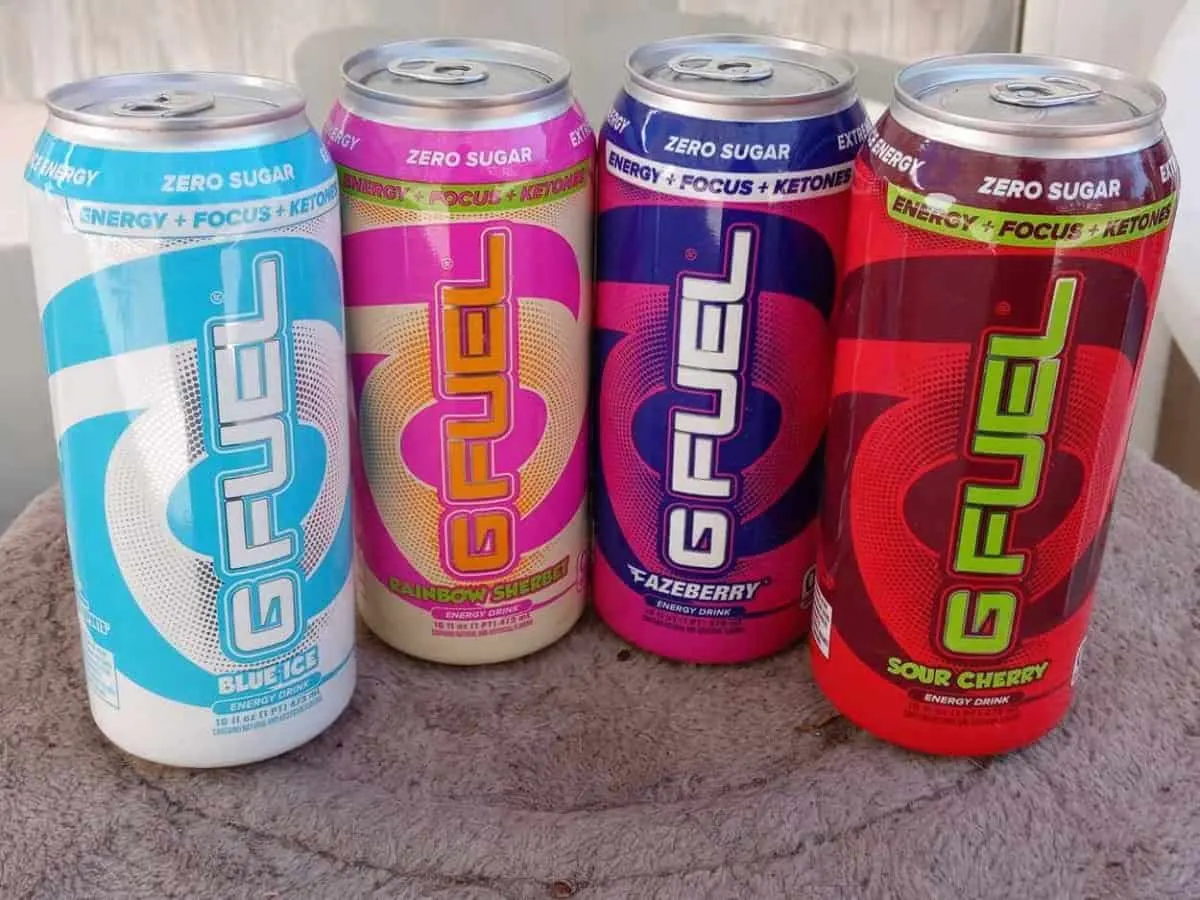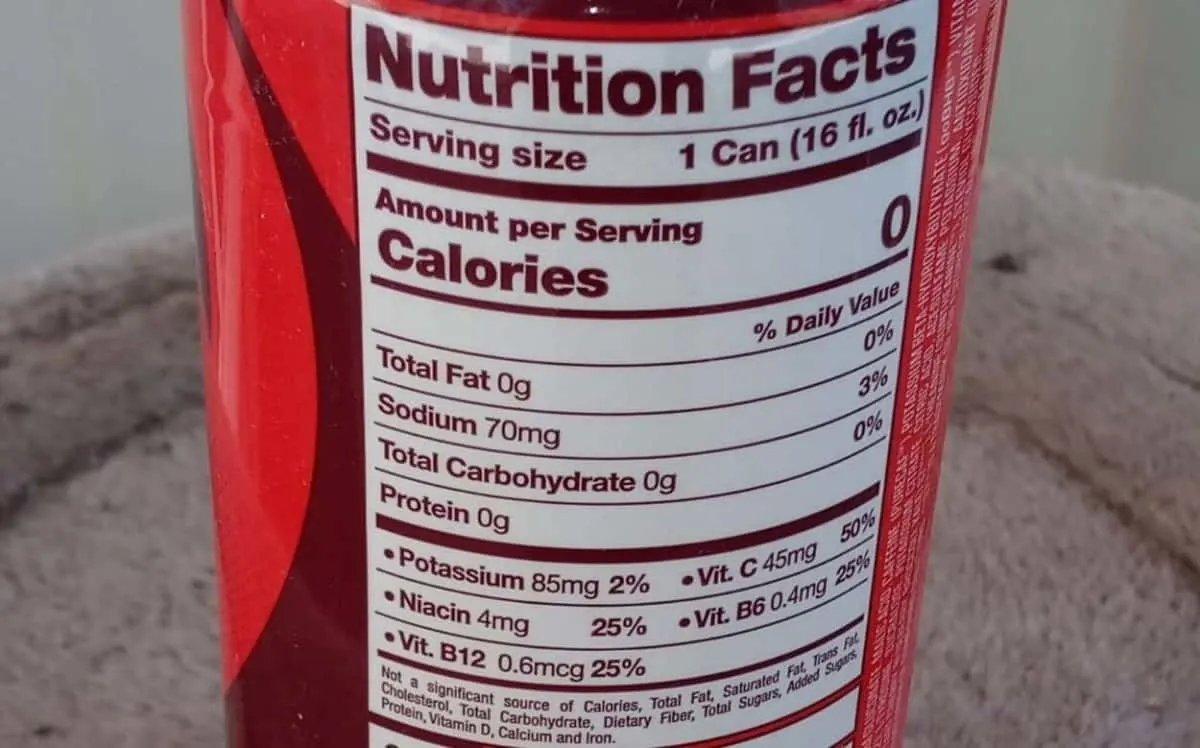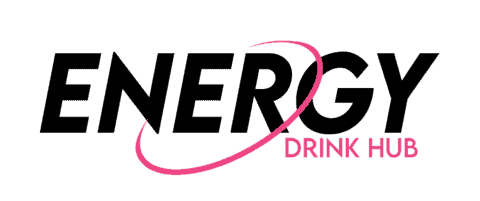
G Fuel and Coffee are both caffeinated beverages that are recognized for providing a great energy punch.
Coffee is a natural stimulant that comes from naturally occurring caffeine such as coffee beans.
G Fuel, on the other hand, is an energy drink that’s uniquely formulated for esports athletes.
Both drinks have their unique strengths and strong caffeine concentrations. Aside from that, both can quench your caffeine cravings.
I know you’re weighing which is better between a coffee or G Fuel energy drink. However, it all comes down to personal choice.
If you’re someone who’s striving to reduce weight while avoiding sweets and calories as much as possible, then G Fuel would be a great pick.
However, if you’re a coffee lover and don’t want to consume a large amount of caffeine, then it’s better to stick with your coffee.
In order to understand better, I have provided a comprehensive comparison between G Fuel and Coffee. So, stick with me until the end of this article.
Let’s start.
Page Contents
G Fuel Vs. Coffee: Ingredients
One of the most crucial aspects that distinguish G Fuel and Coffee is their ingredients. Both G Fuel and coffee have powerful components that provide you with the energy you need throughout the day.
G Fuel Energy Drink Ingredients
To briefly enumerate, here are the ingredients of G Fuel energy drink, in no particular order:
- Carbonated Water
- Natural and Artificial Flavors
- Sodium Gluconate
- Malic Acid
- Caffeine (Purecaf™)
- Potassium Beta-Hydroxybutyrate (goBHB®)
- Vitamin Blend (Maltodextrin, Vitamin C, Vitamin B3, Vitamin B6, Vitamin B12)
- L-Tyrosine
- Sucralose
- Potassium Citrate
- Citric Acid
- Acesulfame Potassium
- Antioxidant Blend (Green Coffee Bean Extract, Green Tea Extract, Turmeric Extract, Tart Cherry, Blueberry, Broccoli, Kale)
- L-Theanine
- Steviol Glycosides
The ingredients of the G Fuel energy drink are displayed on the back of the can:

Coffee, on the other hand, offers more than just a caffeine boost.
Ingredients of Coffee
In fact, coffee goes through a number of processes before it can be consumed. Coffee is made from the coffee tree’s seed or bean.
More than 100 compounds can be found in coffee beans, including:
- Aromatic molecules
- Proteins
- Starches
- Oils
- Bitter Phenoils (acidic compounds)
This is what gives coffee its distinct flavor and taste.
G Fuel Vs. Coffee: Nutrition Facts

G Fuel and coffee both supply nutrients that our bodies require. Let’s take a look at the nutrition information for both G-Fuel and Red Bull side by side.
| Nutrients | G-Fuel Amount Per Serving (16fl oz.) | Black Coffee (8fl oz.) |
| Caffeine | 300mg | 96mg |
| Calories | 0 | 2 |
| Total Fat | 0g | 0g |
| Sodium | 70mg | 5mg |
| Total Carbohydrates | 0g | 0g |
| Sugars | – | 0g |
| Protein | 0g | 0g |
| Niacin | 4g | – |
| Vitamin B12 | 0.6 mcg | – |
| Vitamin B6 | 0.4mg | – |
| Pantothenic Acid | – | – |
| Vitamin C | 45mg | – |
| Potassium | 85mg | – |
The substances of G Fuel energy drink are specifically included with its nutritional value while the nutrients in coffee may vary depending on what ingredients you used.
Typically, a regular cup of coffee contains:
- Riboflavin (vitamin B2): 11% of the Reference Daily Intake (RDI)
- Pantothenic acid (vitamin B5): 6% of the RDI
- Manganese and potassium: 3% of the RDI
- Magnesium and niacin (vitamin B3): 2% of the RDI
I also wrote a more in-depth comparison of Bang and Coffee, which you can check out here.
G Fuel vs Coffee: Caffeine Content
The caffeine content of G Fuel energy drink varies depending on what version you purchased. For powdered version, it contains 150mg of caffeine while the ready-to-drink includes 300mg of caffeine dose.
This is a lot and is very close to the FDA caffeine safe limit, compared to a regular cup of black coffee which has only 96mg of caffeine.
Take note that some factors may also affect the caffeine concentrations of coffee such as manufacturing and brewing time.
Aside from that, it’s important to understand that the maximum caffeine dose one can consume is up to 400mg, based on the FDA‘s caffeine guidelines. Thus, exceeding that significant quantity may put your health at risk.
Consuming caffeine in low to moderate quantities isn’t harmful.
Based on this study found out that moderate caffeine use had the following benefits:
- Improves physical endurance
- Enhance cognitive function
- Increase alertness and concentration
- Boost mood and reaction
- Lower the risk of fatigue
- Lower the risk of oral cancer
- Lower the risk of strokes for older women
If you want to learn more, I’ve published a comprehensive post regarding energy drinks with high caffeine concentrations which you can check out here.
G Fuel vs Coffee: Sugar Content
G Fuel is a sugar-free energy drink. If you’re on a diet or trying to cut back on sugar, this energy drink is a good option.
However, artificial sweeteners like Acesulfame-K and Sucralose are also present in this caffeinated beverage.
Artificial sweeteners, despite being deemed safe by the FDA, may have significant health repercussions if ingested in excess.
Black coffee, on the flip side, can also be consumed without sugar added to it making it a low-calorie drink.
But you can also switch on using artificial sweeteners if you’re conscious of your sugar intake.
For reference, the maximum sugar intake you consume per day should not exceed six teaspoons or 24g for women and no more than nine teaspoons or 36g for men, according to the AHA.
It’s important to keep track of your sugar consumption, in order to gauge how much sugar your body can manage.
Sugar, when consumed in moderation, has a number of benefits, such as:
- Give you a surge of energy
- Improve your mood
- Enhance your concentration
For additional details, check out my top list of sugar-free energy beverages here.
G Fuel Vs. Coffee: Calorie Content
A 16fl oz can of G Fuel energy drink has ZERO calories, whereas a typical 8 fl. oz black coffee contains 2g.
This is a fairly small quantity when compared to Red Bull, which has 110 calories per 8.4-ounce serving, and Monster, which has 200 calories per 16-ounce serving.
So, If you’re following a diet, I believe this amount won’t affect you that much unless you’re consuming more than 1 can of it and/or ingesting calories from other sources.
You should note that the calories don’t pose any health risk as long as you consume them in moderation.
The only way it can affect you (for example, by causing you to gain weight) is if you consume too many of them while doing nothing to burn them off.
The NHS recommends that a daily calorie intake of 2,000 calories for women and 2,500 calories for males.
I’ve put together a thorough list of calorie-free energy drinks here if you want to learn more.
G Fuel vs Coffee: Which Works Better?
Both G Fuel and Coffee work well as long as you take it sensibly.
The brand’s 300mg of caffeine is also guaranteed to keep you energized and alert for a couple of hours. It’s also calorie-free and sugar-free, which is a great win in my opinion.
It’s a perfect alternative to heavy sugar-loaded energy drink products. Additionally, G Fuel contains vitamin blend and anti-oxidant blend mixed in one can.
Coffee, on the other hand, offers various health benefits such as:
- Improve energy levels
- Help you burn fats
- Improve your physical performance
- Contains essential nutrients
- Lower your risk of type 2 diabetes
- May Protect your liver
- Can fight depression
Keep in mind that caffeine can take 20-30 minutes to kick in, so give it time to be absorbed fully into your bloodstream
You should also take into account your caffeine tolerance and sugar intake limit in order to avoid having significant health problems.
G Fuel vs Coffee: Taste
G Fuel energy drinks come in a variety of delicious, sweet, and creative flavors. Black coffee, on the other hand, has a natural bitter taste without sugar and other artificial sweeteners added to it.
G Fuel also offers 20 flavors where you can select from Blue Ice, Bahama Mama, FaZeberry, Strawberry Banana, and many others.
G Fuel vs Coffee: Which Is Bad For You?
Both G Fuel and Coffee are not harmful to your health as long as you don’t go overboard with your caffeine consumption.
These non-water beverages, on the other hand, may jeopardize your health if you have a poor caffeine tolerance or a medical condition.
- Children
Children are not advised to consume energy drinks, particularly those with a large dose of caffeine.
Nausea, vomiting, diarrhea, extreme restlessness, and other side effects are possible to happen if consumed excessively.
- Pregnant
Caffeine is also not recommended for pregnant women. Too much caffeine consumption during pregnancy has been linked to miscarriage and poor birth weight.
- Caffeine sensitive
Individuals who have poor tolerance to caffeine are also not advised to consume Bang Shots and other highly caffeinated beverages for their health’s sake.
They may experience trembling, jitters, headaches, insomnia, anxiety, and many more.
Is G Fuel the healthiest energy drink?
G Fuel is often marketed as a healthier energy drink option. It typically contains no sugar, low calories, and a blend of vitamins, amino acids, and antioxidants. The absence of excessive sugar is a key factor contributing to its perceived healthiness.
Whether G Fuel is considered the healthiest energy drink depends on individual dietary preferences and priorities. While it may be a better choice for some due to its reduced sugar content, the perception of healthiness can vary.
Is G Fuel really good?
The quality and goodness of G Fuel is subjective, but it is generally good. G Fuel is marketed as an energy drink designed to provide an energy boost and enhanced focus without the high sugar content found in many traditional energy drinks.
Whether G Fuel is considered “good” depends on individual preferences, dietary goals, and caffeine sensitivity. Some consumers appreciate its energy-boosting effects, unique flavors, and lower sugar content, finding it a suitable option for their needs. Others might have different preferences or concerns about the ingredients.
Side Effects Of G Fuel and Coffee
One can of G Fuel and one cup of coffee are considered safe to consume.
However, If you consume too much caffeine and go above your body’s caffeine threshold, you may experience the following side effects:
- Anxiety
- Insomnia
- Occasional rapid heartbeat
- Headaches
- Dehydration
- Heartburn
- Upset Stomach
- Irritability
- Jitters
- Restlessness and shakiness
If you experienced one of the symptoms indicated above, please seek medical attention immediately.
Sugar is also one of the substances that have been connected to a variety of health problems, including:
- Addiction
- Obesity
- High blood pressure
- Fatty liver disease
- Chronic inflammation
Apart from that, artificial sweeteners like Sucralose and Ace-K might cause the following health risks if ingested in excess:
- Diabetes
- Increase risk of bowel syndrome
- Weight gain
- Increased blood glucose and insulin levels
- Depression
- Premature Birth
- Decline in cognitive capacity
Children, pregnant women, and caffeine-sensitive individuals are not advised to consume energy drinks with high caffeine concentration for their health’s sake.
If you’re interested in learning more about the negative consequences of energy drinks in general, I covered everything in detail here.
How long does G Fuel caffeine last?
It lasts between 4 to 6 hours, on average.
After consuming a full serving of G Fuel, it usually takes about 10-15 minutes for the desired effects to kick in. The increased energy and focus can last for approximately 4-6 hours. Keep in mind that individual experiences may vary.
G Fuel vs Coffee: Price
The 16 fl. oz cans of G-Fuel energy drink cost roughly $32 per 12 pack, while a wholesale coffee usually costs around $20-$35 per 1kg.
Both of these non-water beverages are affordable and worth the hassle.
Where To Buy?
G Fuel, as well as coffee, is available at a variety of convenience stores and supermarkets, including:
If you’re looking to buy your favorite G Fuel online, these are my top recommendations:
G-Fuel vs Coffee: Flavor
Both G Fuel and Coffee have mouth-watering flavors. G-Fuel has about 20 flavors in total in canned and powdered versions. Here is a list of all of their available flavors:
G-Fuel Flavors
- FaZeberry
- Sour Cherry
- Bobby Boysenberry
- Ragin’ Gummy Fish Cans
- Battle Juice
- Bahama Mama
- Blue Ice
- Bubble Gum
- Cherry Limeade
- Coconut
- Guava
- Nemesis Tea
- Peach Cobbler
- Rainbow Sherbet
- Star Fruit
- Shiny Splash
- Snow Cone
- Strawberry Banana
- Tropical Rain
- Wumpa Fruit
Coffee Flavors
Many people enjoy drinking coffee because of its distinct taste and flavor. Below are some of the flavors of coffee:
- French Vanilla
- Caramel Macchiato
- Pumpkin Spice
- Mocha
- Hazelnut
Alternative To G Fuel And Coffee
Here’s a list of energy drinks other than G Fuel and Coffee:
Is G FUEL a pre workout?
Pre-workout supplements work their magic with ingredients like creatine and beta-alanine, boosting performance. G Fuel, on the other hand, doesn’t have those components, so it can’t quite deliver the same level of performance benefits as specialized pre-workout supplements.
It’s important to note that G Fuel offers its own unique benefits. It focuses more on providing a mental boost and increased focus rather than solely targeting physical performance.
Final Verdict
G Fuel and Coffee are both great energy boosters. G Fuel offers you a good energy punch due to its 300mg caffeine. It also doesn’t contain any calories and is sugar-free.
Whereas, coffee stands out because of its natural strong taste and aroma. Black coffee, for instance, includes only 96mg of caffeine and can be consumed with or without sugar added.
Both G Fuel and Coffee have their own advantages and drawbacks.
G Fuel provides you with a lot of substances proven to boost your energy and improve your concentration. Coffee, on the other hand, has low caffeine content, thus it has a low risk of causing caffeine-related health concerns.
If you want to avoid caffeine-related health problems, I suggest limiting yourself to one can per day.
Consume them just when you’re convinced that they’re actually necessary or if you’re in urgent need of a caffeine boost.
Once again, it all depends on what you’re looking for in a non-water beverage. Personally, I prefer G-Fuel rather than coffee since I always have lots of workloads, thus I need more caffeine boost.
However, each of us has our own preferences. You can experiment with different brands to find which one best matches your needs.
